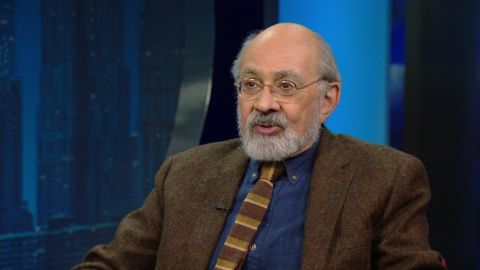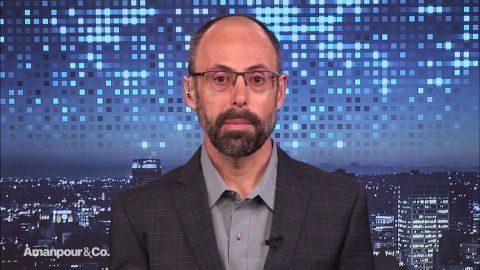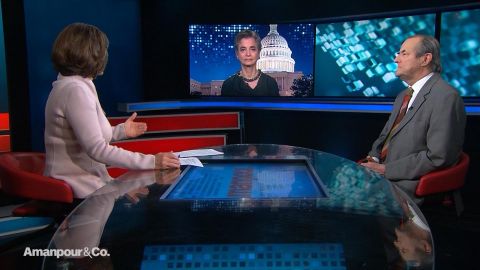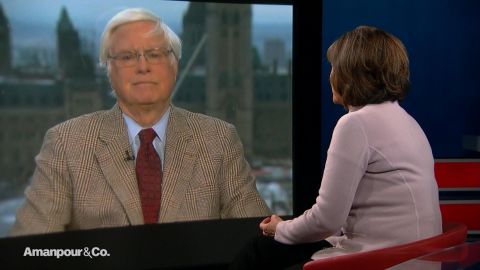Read Transcript EXPAND
CHRISTIANE AMANPOUR: In the meantime, a study says most Americans couldn’t place Iran on a map. The United States has a long and complicated history with that country. Dating back to before the ayatollahs came to power in the 1979 Islamic Revolution Ervand Abrahamian is an Iranian-Armenian author, historian and university professor, whose book “The Coup” is his latest work, unpacking U.S.-Iranian relations. Our Walter Isaacson sat down with him to discuss the events that contributed to the distrust and hostility between these two nations.
(BEGIN VIDEO TAPE)
WALTER ISAACSON: Let’s set this into historical context and begin in 1951 when Iran nationalizes its oil industry. How does that set a context of what’s happening?
ERVAND ABRAHAMIAN, HISTORIAN AND AUTHOR, “THE COUP”: It’s a very important background context because for Iran, the nationalization of oil in ’51 was the same as other colonial powers getting — colonial states getting their independence from the former colonial ruler. So, it was a way of declaration of independence from Britain to take over the main natural resource Iran had, which was oil. It was, in fact, equivalent to Indian independence, Indonesian independence.
ISAACSON: They even lower the oil company’s —
ABRAHAMIAN: Yes.
ISAACSON: — flag and raise the Iranian —
ABRAHAMIAN: Yes.
ISAACSON: — flag as if it were a transfer of colonial power.
ABRAHAMIAN: It was. And it would seem that way both in Iran and Britain.
ISAACSON: Yes.
ABRAHAMIAN: So, if you look at the British press at that time, especially the newspapers like “The Daily Telegraph,” conservative papers, they saw this as another sort of blow against the British empire. To try to balance that off, actually when the flag was lowered and the Iranian flag was raised, the RAF flew jets or planes over at Abadan in a way to say, we still have the — basically, the military power.
ISAACSON: But then Britain and the United States, CIA, MI6, in 1953, foment a coup in order to reverse this decision. Was that about oil or was that about decolonization?
ABRAHAMIAN: The very historical question is why was the U.S. interested in helping a coup? And what the argument really was at that time that if Iran succeeds in nationalizing the oil industry, even though it’s a British oil industry, this will start a bad example, and other countries where American oil interests were, like Venezuela, Indonesia, Kuwait, Saudi Arabia, that those countries would try to basically follow the example of Iran And you would get a swift — basically, a snowballing effect of nationalization of oil. And that would really weaken American interests. So it was basically the fear of a bad example leading to what — the repercussions.
Of course, eventually, in the ’70s, 1970s, oil was nationalized throughout most of these countries. But, in 1951, it was seen by both the State Department and American oil companies that, basically, it would be the end of Western civilization as we knew it, the sky would fall if these natives, countries, basically took over their oil.
ISAACSON: So we put, meaning the United States and the West, the shah, the shah of Iran, into power after that coup in ’53, or back into power, as a real ruler of the nation. And he becomes a lynchpin of Western security in the region. How long did that last?
ABRAHAMIAN: It lasted basically from ’53 to ’79. And, superficially, it looked very stable. Here we had monarch, claimed 2,500-year history of monarchy. He had a huge army, huge military forces, a huge bureaucracy, and, of course, after the oil boom of ’73, unlimited oil resources. So, on the surface, it looked like a very stable, formidable ally. That’s why Nixon basically appointed him American policeman of the region.
ISAACSON: But it doesn’t work. This — 1979, there’s suddenly a huge revolution, which most people don’t predict, right?
ABRAHAMIAN: Well, that’s the problem. On surface, because it seemed so formidable, it looked like it was going to last. Even in 1978, the CIA’s estimate was that, you know, there were no problems in Iran until the oil runs out. The problem with their analysis was that they didn’t really understand that the ’53 coup had really delegitimized the monarchy.
ISAACSON: Do you actually believe that people in Iran in the ’70s felt that the shah was illegitimate…
ABRAHAMIAN: Yes.
ISAACSON: … because of something that happened in ’53?
ABRAHAMIAN: Yes. I mean, the memory of ’53 was very formidable. I mean, it was the main event that had occurred in Iranian history, basically, in their memory. And they knew — I mean, everyone basically knew that this regime was installed by the British and the Americans in ’53. So it was — but, more than that, it was installed by overthrowing Mosaddegh there, who was seen as the emblem of national aspiration.
ISAACSON: He was the prime minister.
ABRAHAMIAN: Yes.
(CROSSTALK)
ABRAHAMIAN: It would be like in — let’s say in India, Nehru and Gandhi were overthrown and some British supporter came to power. They wouldn’t have legitimacy of an independent state.
ISAACSON: What was life like in the ’70s under the shah?
ABRAHAMIAN: For the middle class, upper class, it was actually quite good, because, with the oil boom, there was considerable amount of economic prosperity at the higher levels.
But on the general public, there was still a great deal of deprivation. There was lack of schooling, lack of universities, lack of medical care. Those issues really then aggravated class differences between the better- off and less-off. So the revolution became very much also an uprising of the poor against the regime.
ISAACSON: We know the revolution, the way you describe it in your book, is also a uprising that’s populist, that’s religious, that’s somewhat paranoid, very fervent, almost alt-right. It seems like it’s part of a whole global populist rebellion.
ABRAHAMIAN: The best way to define it, some people called it fundamentalist. Sure, there was religion, but the way the clerics reinterpreted Islam was a very, very new way that really made it into right-wing populist movement. So they tapped into things such as nationalism, anti-imperialism, what they called the mostazafin, which is the downtrodden, the retched of the earth, the poor, that the state should represent them.
So, if you look at their rhetoric, actually, it sounds very radical. And, in some ways, they were trying to compete and outdo the left on basically social radicalism.
ISAACSON: And they end up defeating the left, because you have the mujahideen, which is somewhat of a left-wing, right, anti-shah party.
ABRAHAMIAN: Yes.
ISAACSON: And then you have the clerics, the mullahs.
ABRAHAMIAN: Yes.
ISAACSON: And they, the mullahs and clerics, end up taking over this revolution. How did that happen?
ABRAHAMIAN: Well, I think the clerics some ways had much more social support. The mujahideen had a lot of support in high schools and university. But the clerics, with their rhetoric, appealed to the poor, especially urban poor or recent arrivals from the villages. They had their mosques, which was an informal network that existed and it’s a way the secret police and the SAVAK could have really disbanded the mosques. But, also, there’s the fact that they — although the language was rhetorically very radical, Khomeini, and his ideology very much had roots in the petty bourgeoisie, the middle class of the bazaar. So these are very, you can say, traditional shopkeepers, merchants, more entrepreneurs that are located in the bazaar. They have very close networks. And they have very strong ethics about Islam and social justice. And he — and Khomeini’s, basically, theology appealed to that base. And they had a great deal of money, actually, so they were able to finance the revolution.
ISAACSON: And, SAVAK, the secret police under the shah, to what extent did that cause resentment that eventually exploded?
ABRAHAMIAN: Obviously, the oppression created resentment. It was a period, actually, in the ’70s. There was a lot of literature you just couldn’t read. If you went to a secret bookstore, usually, the joke was, well, if you are caught with this book, that’ll get you five years, if you get this book, 10 years. So it was basically the bookstores could tell you how many years you would get for possessing various books. So, oppression was there. But, again, oppression is not really enough to explain a revolution. We can see nowadays many countries become more oppressive. It doesn’t mean that there’s more discontent.
ISAACSON: But it was more than just oppression. I mean, there was torture. There was fighting back.
ABRAHAMIAN: Yes, there was, I mean, especially this period when they started using the tactics of torture to get confessions for public arena, not confessions for information, but to force people to go on television and basically confess that they had made mistakes, they had now seen the light; in prison, they had read books and now seen how great the shah was and so on. That actually further alienated, I think, especially the intelligentsia, from the regime.
ISAACSON: How important was the shah to America’s foreign policy? And why did the U.S. insist on trying to keep him?
ABRAHAMIAN: It mainly is due to the Nixon doctrine.
After Vietnam, Nixon had the notion that, basically, U.S. was overstretched and needed to outsource its, basically, power. And the obvious — from Nixon’s point, the obvious person to outsource it was the shah in the Gulf. So, especially when Britain decided to move out of east of Suez, the shah then quickly said, you know, I will be the person. But part of that deal was that you, the U.S., basically sold the shah whatever weapons it wanted, even though a lot of people in the Pentagon, State Department said this was not a good idea.
But there was an ongoing debate. And this debate, I would say, the business community sided with the shah. Give him whatever he wants. So, another aspect of, I think, the business community supporting the shah was that you don’t interfere or meddle too much in Iranian politics. You don’t talk to opposition figures. You basically write reports that everything is fine, the shah knows what he’s doing. You don’t even check into internal politics to see what’s going on. So, when the revolution started, the U.S. Embassy and the CIA were really taken short, because they really didn’t know who was who. For years, they had been told not to talk to people.
ISAACSON: You were in exile, I know, when the Ayatollah Khomeini returns to Iran. But describe to me what that was like in Iran and what that meant.
ABRAHAMIAN: Khomeini by then was like a charismatic figure. I don’t think it was his person. It’s the situation that created the charisma. But when he returned, literally millions, I think something like an estimated three million people came into the streets to greet him. It was really basically an outpouring. And it was like the messiah returning.
ISAACSON: Why?
ABRAHAMIAN: Because he was seen as the symbol of a revolution, the person who was going to bring a new Iran, independent Iran. And, also, he was authentic. He all — spoke basically in Persian. He was very literate, but he also often spoke in Persian that the average person could relate to. He had basically lived a simple life, so he wasn’t identified with the rich and so on. And, of course, the rhetoric I talked about of populist rhetoric very much appealed to the average person. So he was seen as a basically superhuman person who had come to save the country.
ISAACSON: When the embassy gets taken over by the students, originally, this is the beginning of the revolution.
What were the options then that could have saved this from becoming as bad as it did?
ABRAHAMIAN: When the students took over, they thought it was a sort of temporary act to stop the Americans carrying out the ’53 coup again. So they didn’t think in long terms. But what Khomeini did, as a very sort of Machiavellian politician, he used this for his own interests, which was to get a clerical constitution through. Khomeini’s disciples in the Constituent Assembly really revamped the document and brought in great deal of clerical influence, so that you would still have the sort of the markings of a democratic republic, but umbrella organizations which are clerical to supervise everything. And if he had gone — if there was if there was a choice to the public of a republic or a clerical republic, there was a good chance that the public would have expected a republic.
ISAACSON: In other words, not had an Islamic republic with clerical oversight.
ABRAHAMIAN: Yes.
ISAACSON: So, how did we end up getting all of that?
ABRAHAMIAN: Well, the hostage crisis helped that.
ISAACSON: Ah, I see.
ABRAHAMIAN: In the height of the hostage crisis, Khomeini dragged it out. There was always an image, the U.S. is going to attack. The U.S. is the imminent enemy. There was attempt, of course, to rescue the hostages. In that context, then they took the document to the public and said, are you going to vote for this constitution? Or, if you voted against it, it was like going against the country, supporting United States.
And so then even the people who’d written the original constitution, Bazargan, ended up having to vote for the clerical constitution, because they didn’t want to be labeled as pro-American.
ISAACSON: There’s some lessons for today, of course, which is that, if we give an excuse to demonize the United States, the hard-liners take that and run with it. And that’s what happens in ’79. It’s what’s happening today.
ABRAHAMIAN: And this will — actually will happen very much next month, because Iran is about to have parliamentary elections in February. And I’m sure they will use this issue, the right-wing populists, to appeal to the public that the country’s still in mortal danger, you have to vote for tough guys. And they might very well sweep the parliamentary elections. Then you’re going to have a government that’s much more hard-lined than the present Rouhani government.
ISAACSON: Professor, thank you so much.
(CROSSTALK)
ABRAHAMIAN: Thanks very much.
ISAACSON: Appreciate it. Very good.
About This Episode EXPAND
Former Canadian Ambassador Michael Kergin discusses the human cost of this week’s diplomatic drama. Then, experts Richard Dalton and Barbara Slavin explain the current state of affairs between the U.S. and Iran and Ervand Abrahamian tells Walter Isaacson about the long and complicated history behind the two countries’ relationship. Plus, anthropologist Daniel Fessler makes the case for kindness.
LEARN MORE



